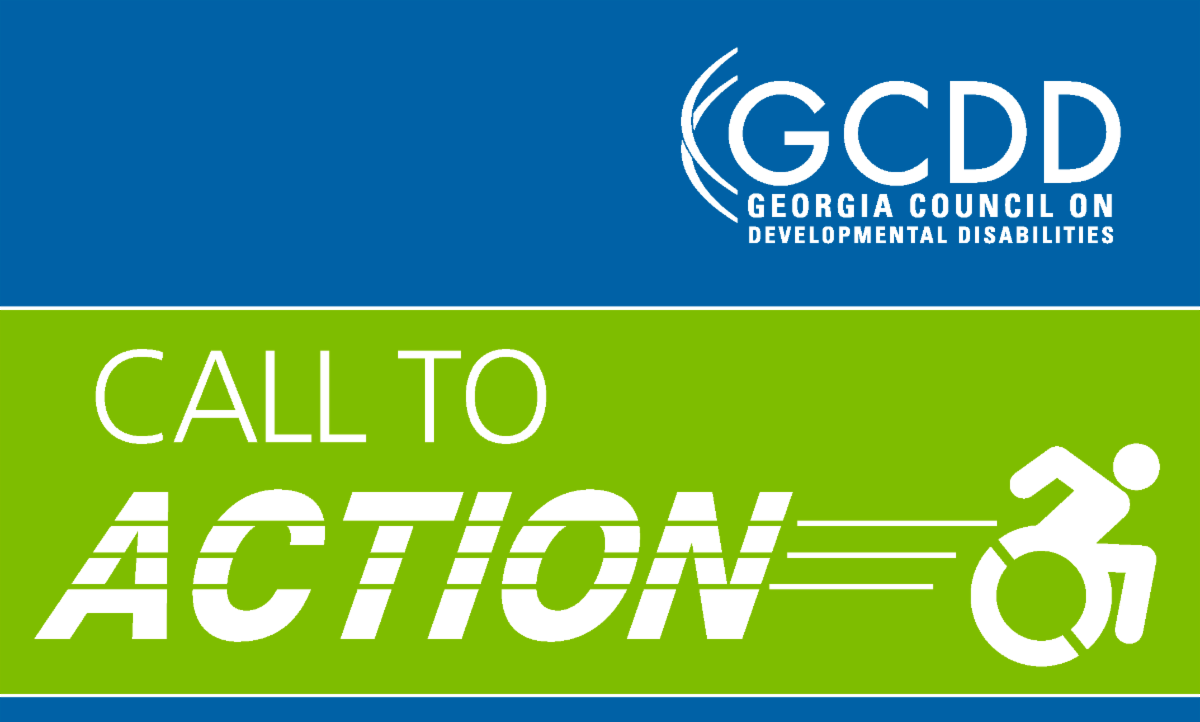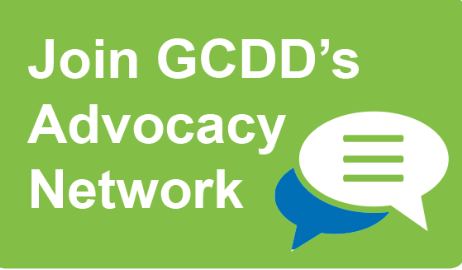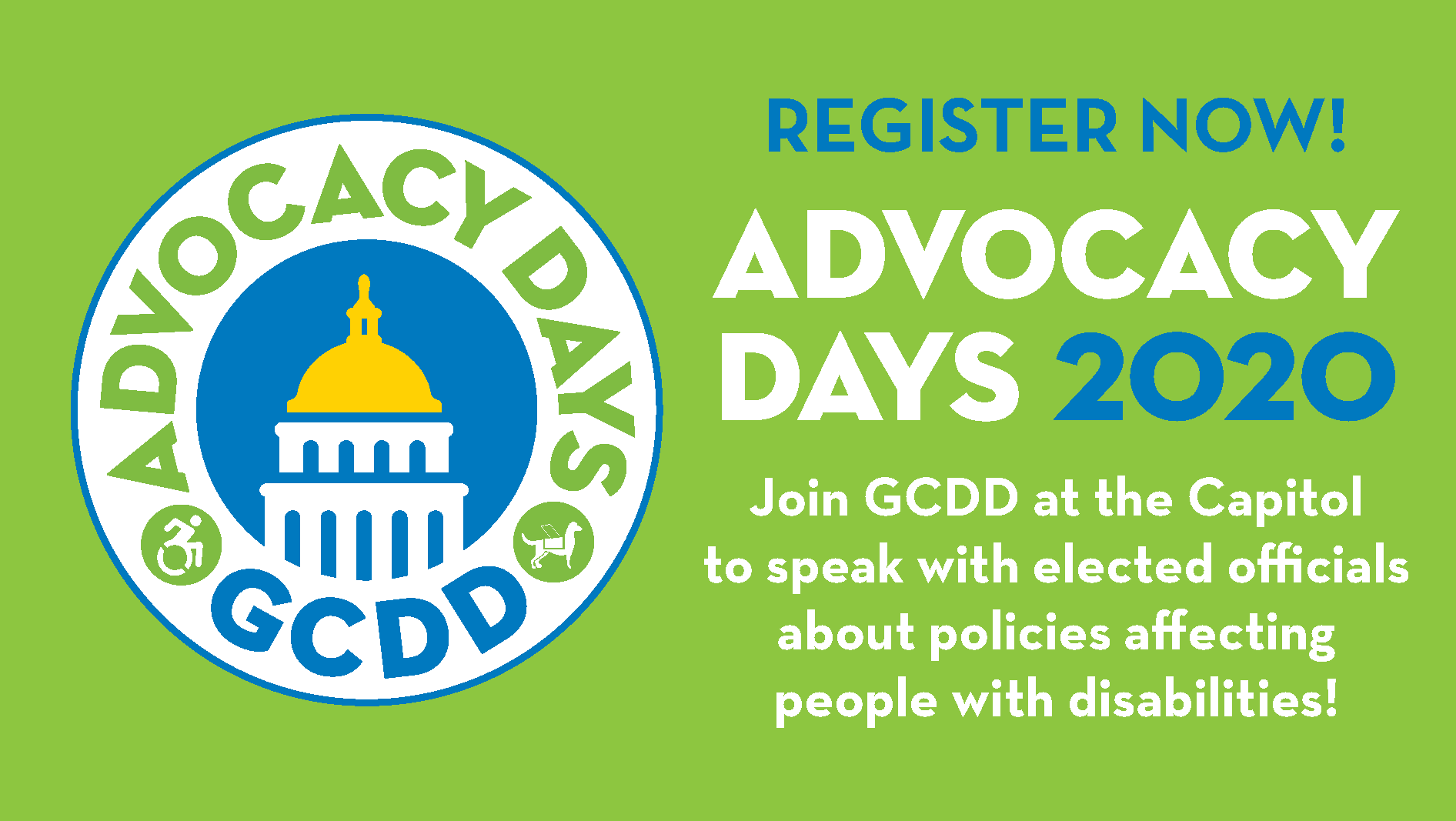Public Policy for the People: February 3, 2020

See you at the Capitol!
 Alyssa Lee, PsyD, Public Policy Research and Development Director
Alyssa Lee, PsyD, Public Policy Research and Development Director
 Charlie Miller, Legislative Advocacy Director
Charlie Miller, Legislative Advocacy Director You Can Get Involved!
There are many ways to get involved in the 2020 legislative session! We have public policy calls, five Advocacy Days and so many more ways you can get advocate all year round.
Sign up for GCDD Advocacy Days!
Check out more details below.

Join our Public Policy Phone Calls at 9:30 AM on:
February 10, February 24, March 9 & March 23.
 GCDD invites you to join its Advocacy Network and work together to create a better place for Georgians with disabilities.
GCDD invites you to join its Advocacy Network and work together to create a better place for Georgians with disabilities. Looking Ahead: Advocacy Days are Here!
- Feb 6: Inclusive Post Secondary Education (IPSE) Day (SOLD OUT)
- Feb 19: Home and Community Based Services (HCBS) Day (SOLD OUT)
- Feb 27: School to Prison Pipeline (SToPP) Day
- Mar 11: Employment Day
Click here to register for Advocacy Days
Be in the Know: All About the Budget!
- $34,781 cut to GCDD's IPSE funding.
- $50,000 cut to eliminate funding for supported housing in Forsyth County for individuals with developmental disabilities.
- $1 million dollar cut to reduce funds for intensive family supports for people with developmental disabilities (specific to Bobby Dodd Institute).
- $1 million dollar reduction for assistive technology research through Georgia Tech.
- $2.5 million dollar reduction for supported employment adult mental health services
- $8.3 million dollar reduction for behavioral health services
- $3.5 million reduction in supported employment for child and adolescent mental health services
- No NEW NOW/COMP waiver slots (first time in a decade that the Governor has not requested new slots to help reduce the over 6,000 person waitlist)!
- Senator Dean Burke (Vice-chair)
- Senator Chuck Hufstetler
- Senator Butch Miller
- Senator Horacena Tate
- Senator Ben Watson
- Representative Tom Kirby (Vice-chair)
- Representative Tommy Benton
- Representative Emory Dunahoo
- Representative Michele Henson
- Representative Don Hogan
- Representative Henry “Wayne” Howard
- Representative Karen Mathiak
- Representative Greg Morris
- Representative Mary Margaret Oliver
- Representative Bert Reeves
- Introduce yourself and let them know if you live in their district
- Tell them why you are calling (e.g., I am calling to discuss the lack of NOW/COMP waiver slots in the Governor’s recommended budget)
- Tell them why this is important to you (e.g., I am on the waitlist, my family member/friend is waiting for services, etc.)
- Tell them what you would like them to do (e.g., I would like you to include the addition of new waiver slots in the budget)
- Thank them for their time!
 Fiscal Year (FY): The state of Georgia organizes their budget by fiscal years, which do not line up with calendar years. You will often see Fiscal Year abbreviated to FY. Fiscal Year 2021, or FY20, covers July 1, 2020 - June 30, 2021. Some people call this the Big Budget.
Fiscal Year (FY): The state of Georgia organizes their budget by fiscal years, which do not line up with calendar years. You will often see Fiscal Year abbreviated to FY. Fiscal Year 2021, or FY20, covers July 1, 2020 - June 30, 2021. Some people call this the Big Budget.
Bills to Watch!
- HB 444: Dual Enrollment Act
- HB 804: Georgia Equal Employment for Person with Disabilities Code
- HB 839: Employment Security for People with Disabilities
- HB 842: Gracie's Law (ends organ transplant discrimination for people with disabilities)
- HB 845: Additional Compensation for Teachers with Special Education Certification
- HB 849: Authorized Electronic Monitoring in Long-Term Care Facilities Act
- SB 125: Adult Changing Stations
- SB 291: Georgia Death with Dignity Act
- SB 330: PeachCare Public Option Program
- SB 335: Foster Children and Foster Families
Federal Update: CMS Block Grant Guidance
Tags: GCDD, Advocacy, public policy

